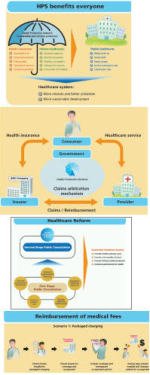 The Hong Kong government comes up with, according to the South China Morning Post, the sixth package of healthcare finance reform proposals since 1993. My own files also include reams of discussion papers by academics, think-tanks and insurers. They all have three things in common: they aim to solve a problem that exists only in the eyes of bureaucrats; they have so far always been rejected by an unimpressed public; and they have stupid titles.
The Hong Kong government comes up with, according to the South China Morning Post, the sixth package of healthcare finance reform proposals since 1993. My own files also include reams of discussion papers by academics, think-tanks and insurers. They all have three things in common: they aim to solve a problem that exists only in the eyes of bureaucrats; they have so far always been rejected by an unimpressed public; and they have stupid titles.
Attempt number six, My Health, My Choice, follows in this noble tradition, except that it proposes only a voluntary, subsidized add-on to the existing system, and thus can be considered a success even if 95% of people reject it.
As in the past, the whole exercise rests on the assumption that Hong Kong faces a healthcare financing crisis. But we don’t. In 2004 (the data used in the 2008 consultation document Your Health, Your Life) the Big Lychee collectively spent 5.3% of its GDP on healthcare; government expenditure on health was just 2.9% of GDP. The great fear – cue creepy aging-population violins – is that these figures will rise to 9.2% and 5.5% respectively by 2033.
This is a problem? If you want a looming nightmare of unsustainable healthcare spending, try the US, where health expenditure is already nudging 16% of GDP, or even the UK, where government spending on health is already approaching 8% of GDP. Our government wants us to believe that a scenario the Americans or British can only dream of is a fiscal disaster here.
The government currently spends around HK$30 billion a year on healthcare – mainly on hospitals. As waiting lists show, this is plainly inadequate. But we could easily raise that to the supposedly horrifying 2033 outlook of HK$55 billion (at current prices) right now without cutting other essential public services or raising taxes: the investment income from a trillion bucks’ worth of fiscal and monetary reserves would pretty much cover it.
Another plentiful source of extra recurrent expenditure could come from a civil service pay cut –maybe some HK$1 billion a year for every 1% shaved off the bureaucrats’ bloated salaries. As a one-off exercise in spending Hong Kong people’s money on Hong Kong people, we could scrap some pointless infrastructure mega-projects and use the savings to send patients to overseas facilities to sort out the waitlist-backlogs of basic elective surgical procedures. (The High-Speed Train to Shenzhen equals well over two years’ public healthcare expenditure.) And let’s not forget that many middle-class patients could easily afford far more than the HK$100 a day public hospitals charge for all and any treatment. It would be easy and largely painless to expand the public system or fund more outsourcing to meet needs. The cash is there. Our main health threat is drowning in it.
Instead, imbued with the colonial mindset that expenditure on the population is an evil, officials have sought the most tortuous alternative ways of increasing healthcare resources. Long and arduous discussions with patients’ rights groups, employers, private hospitals and insurers have inevitably resulted in a mishmash that will somehow benefit everyone. Premiums will be low, coverage will be guaranteed, benefits will be attractive, private hospitals will do extra business, insurers will be in clover, and I am Marie of Romania.
The proposed scheme is voluntary, so by definition people will join it only if they will gain something. Out of frustration, the government is thus forced to do what it hates most and is pledging HK$50 billion from the reserves to lure people into signing up, prompting the obvious question: why not just spend it on treating people who need it? The scheme will not cover primary care. It will pay private hospitals far less than they usually make from the well-insured/rich/Mainland 8% of patients they currently treat. The public system will still be there as a safety net, and you can be sure the private sector will drop anyone straight into it as soon as it will save them money to do so.
Can’t wait for attempt number seven.


The main test of any healthcare proposal is whether the insurance sector supports it. If they do, then it’s bad for everyone else. If the government manages to accidentally stumble upon a healthcare package that the insurance sector hates, then that’s the one to go for.
When private hospitals and the insurance industry supports such a ‘reform’ it’s easy for HK’ers to smell a rat. Probably the same people who find most of their daily expenditure returning to one or two well known hongs. I am amused at least to see those who normally bray about Government interventon sullying the market mechanism proposing just that. But this time there’s an earn in it, so….